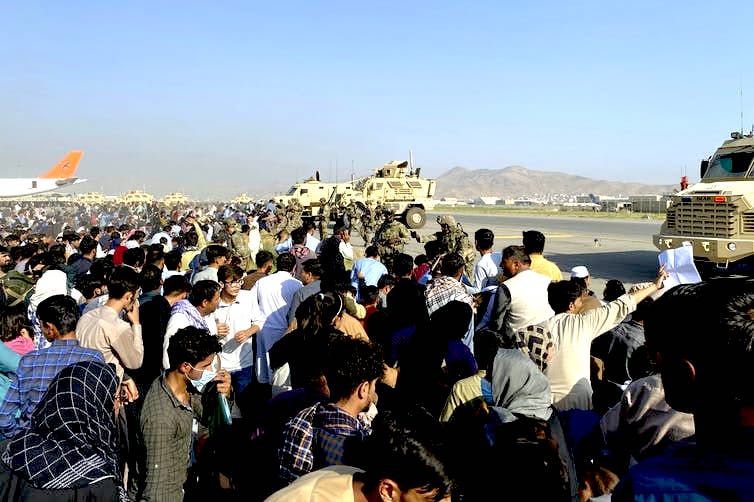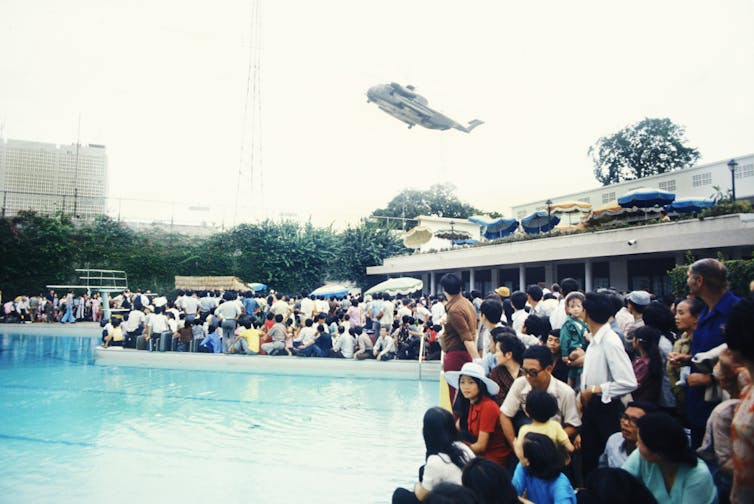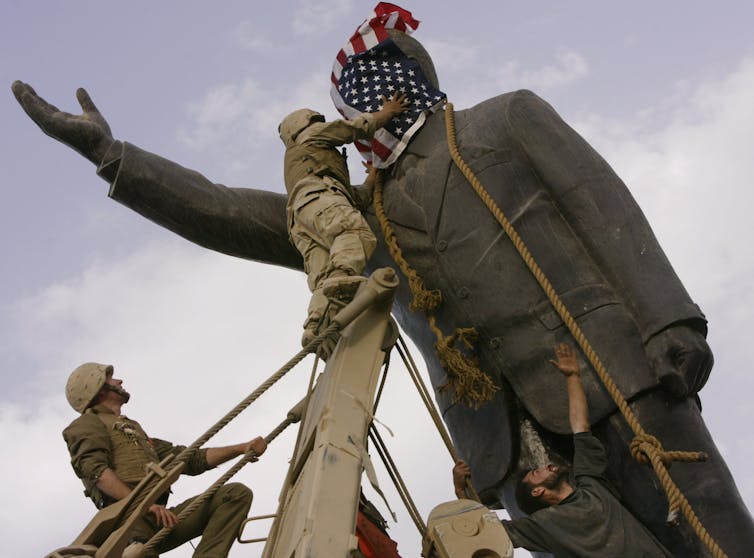The U.S. capacity for official lying has struck once again, as it has repeatedly for the last 60 years, writes Gordon Adams.

On Aug. 16, thousands of Afghans trapped by the sudden Taliban takeover rushed the Kabul airport tarmac. (AP, Shekib Rahmani)
American University School of International Service
 In Afghanistan, American hubris — the United States’ capacity for self-delusion and official lying – has struck once again, as it has repeatedly for the last 60 years.
In Afghanistan, American hubris — the United States’ capacity for self-delusion and official lying – has struck once again, as it has repeatedly for the last 60 years.
This weakness-masquerading-as-strength has repeatedly led the country into failed foreign interventions. The pattern first became clear to me when I learned on Nov. 11, 1963, that the U.S. embassy and intelligence agencies had been directly involved in planning a coup to depose the president of South Vietnam and his brother, leading to their executions.
I was a Fulbright Fellow, starting a long career in national security policymaking and teaching, studying in Europe. On that day, I was in a bus on a tour of the battlefields of Ypres, Belgium, led by a French history professor.
As I watched the grave markers sweep by, I was reading a report in Le Monde exposing this U.S. effort to overthrow another government and I thought, “This is a bad idea; my country should not be doing this.” And the war, in which the U.S. was directly involved for 20 years, marched on.
The American people were told we had no hand in that coup. We did not know that was a lie until The New York Times and The Washington Post published the Pentagon Papers in 1971. By then, 58,000 Americans and possibly as many as 3.5 million Vietnamese soldiers and civilians had died — and the goal of preventing the unification of Vietnam had died as well.
For 15 years, the American foreign policy establishment struggled to overcome what it called the “Vietnam Syndrome” — the rational reluctance of the American people to invade and try to remake another country.
American hubris reemerged, this time as “the global war on terror.” Afghanistan is now the poster child for the sense that the U.S. can remake the world.

In 1975, helicopters evacuated Americans and Vietnamese people from the U.S. embassy in Saigon. (Nik Wheeler, Corbis via Getty Images)
Osama bin Laden gave American interventionists eager for the next fight a huge justification — an attack on the U.S., which washed the Vietnam Syndrome away in a sea of righteous retribution against Al Qaida.
The Al Qaida attack on the World Trade Center and the Pentagon also gave interventionists the opening to invade Iraq, as an extension of the war on terror. We built on the terrorism lie — Saddam Hussein was no friend of the 9/11 terrorists — by arguing that he had weapons of mass destruction. American hubris ran the full course as we invaded another country, overthrew its government and aimed to build a new nation, all of which have kept American troops in a dysfunctional Iraq for 18 years.
And the truth, which insisted on penetrating the American delusion, was that the war meant the deaths of 8,500 American troops and civilians and at least 300,000 Iraqis as well. No modern, rebuilt Iraqi nation has emerged.
And now the country faces the dark at the end of the tunnel in Afghanistan, where lying and self-delusion have continued for 20 years.
An initial mission intended to remove the Taliban and close the AlQaida training camps succeeded, though Osama bin Laden slipped away for another 10 years. But hubris kept the U.S. from stopping there.
The mission expanded: create a modern democracy, a modern society and, above all, a modern military in a country with little history of any of those things.
A new generation of U.S. officials in uniform and policymaker suits and dresses fooled the American people and themselves by lying about how well the effort was going.
The failure was actually there to see, this time, well documented by the systematic auditing and reporting of the special inspector general for Afghanistan reconstruction, John Sopko. But government officials and the media blew by those truths, giving voice instead to the lies out of more visible officials’ mouths. The human price tag of hubris grew – 6,300 U.S. military and civilian deaths, and an understated estimate of 100,000 Afghan deaths.

U.S. soldiers cover the face of a statue of Saddam Hussein before pulling the statue down in Baghdad, in April 2003. (AP, Jerome Delay)
Three Strikes & You’re Out
Three times now this country has been lied to and the media deluded as America marched stolidly over the cliff into failure.
Recriminations are flying back and forth — who lost Afghanistan is the latest version of who lost Vietnam, Iraq and, for those with long memories, all the way back to 1949 and “who lost China.” What America has lost is, I believe, the capacity to learn, to learn from history and from our own experience.
I’d argue that no one who was paying attention should be surprised that the Taliban swept back into Kabul in a nanosecond. Or that a failed enterprise like the Afghan national army collapsed. Army and special operator trainers who went there could see the corruption, the personnel who left in the night and the disdain for corrupt political authorities in that army.
Many brave, honorable Afghans fought there, but the cohesion and commitment, the belief in their mission, was not there.
By contrast, the Taliban were organized, dedicated and coherent, and armed and trained for the actual combat taking place, not for European-style trench and tank warfare. The Taliban clearly had a plan that worked for that country, as the speed of the takeover shows. It succeeded; the U.S. and the Kabul regime failed in what became mission impossible.
The fall of Kabul was inevitable. Washington, once again, deluded itself into thinking otherwise. The secretary of state said, “This is not Saigon.”
It is Saigon. It is Baghdad. It is Kabul.
Gordon Adams is professor emeritus at American University School of International Service.
This article is republished from The Conversation under a Creative Commons license. Read the original article.
The views expressed are solely those of the author and may or may not reflect those of Consortium News.

Excuse me for stating what should be obvious to conscious thinking people — All wars are driven by deceit and delusion. However, those that send the young men and women to those wars of aggression have no qualms about doing so. In our failing economy and lack of morality, war / military behavior is the un-official jobs program of the US. I did not participate in the military and do not support our troops to kill and maim anywhere and anytime in crushing others as they well damn well please.
And now our Fearless Leaders want to invade China or Russia or both. Morever, lots and lots of ordinary Americans are going along.
We made sure the Afghans had nothing to really fight for. It was a choice between Islamist fundamentalists we originally armed and trained and a corrupt puppet regime propped up by the US in order for a few ultra-rich families to make huge unquestioned wartime profits. Who among us would want to put his or her life on the line for either one?
Professor, a few points if I might?
1. The people of Afghanistan were innocent of ANY involvement with 9/11.
2. Lies, far more than three, have been the means by which the elite deceived the many into “believing” the “delusions”, which you suggest the elite wholeheartedly, honestly and earnestly, also believed.
Remember the Maine?
Or the lies around the use of atomic weapons on the civilian populations of Hiroshima and Nagasaki.
3. The Afghan war cost $300million a day. Everyday, for years and year. Most of that money returned to line pockets in the U$ permitting far more corruption here, than all the corruption a much smaller portion of that war-booty caused in Afghanistan.
4. As “policy”, torture was first denied as being such and then was mystified by euphemism, a form of rhetorical deceit.
5. The use of “we” and “our” must be quite careful. Big “WE” are the “deciders”, while small “we” never get to have any meaningful say on policy, “we” only get to choose the “personalities” of the Deciders.
I do wonder if you are suggesting that the deceits, the lies, used to take this nation to war are, somehow, excused because the liars “believed” their lies and that their delusions justified those lies and that, therefore, the liars deserve some kind of pity or tolerance rather than consequence?
Frankly, I consider that lying this nation into war against those who had done “us” no harm, posed “us” no harm engaged in what, effectively, borders on treason, as their delusions and wars have brought this nation into ever lower repute, even as, domestically, neoliberalism (greed is good) has brought the loss of “our” industrial capacity (not to mentions jobs) and “our” ability to produce what “we” need.
Surely, even as an academic, you must have noticed the increasing precarity and the lack of a capable healthcare system in the midst of a global pandemic.
Perhaps you have noticed that the lies of the elite, most often, are about “slamming small nations up against the wall, so that the world knows that “WE” mean business?
Or, perhaps not?
Do you, professor, think, consider, or believe, that official lies deserve consequence.
I suggest that “we” do not like being lied to, even if “we” only find out the actual truth years or decades later.
The Pentagon Papers and the Afghanistan Papers relate the same, sordid tale of lies, bipartisan, consistent, and apparently, beyond ANY suggestion that such deceits require, indeed demand a consequence, else deceit will be used again, and again to benefit the “interests” or “delusions” of the elite at great, even overwhelming cost to the rest of “us”.
hXXps://peakempire.wordpress.com/2009/11/13/the-pushtun-and-the-gringo/
In the case of both Vietnam and Afghanistan the US stepped into a civil war and tried to chose the winner. Iraq has already told the US to leave and been told to stuff it. Korea is the only place where the artificial separation of communist and US vassal still holds. All of these should be violations of international law. But what bothers me is that Mr Adams acts as if the Taliban is some kind of malign external force. They aren’t THEY’RE AFGHANS. Everybody seems to forget that, in essence, the US was asking our puppet government in Kabul to get Afghans to fight other Afghans (friends, relatives, associates) and die for the US. That’s pretty much always a losin’ proposition.